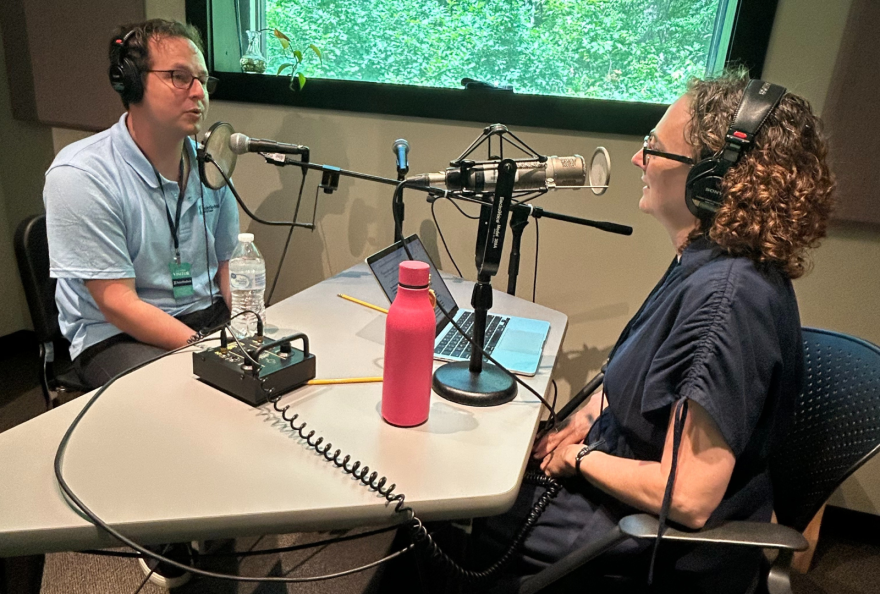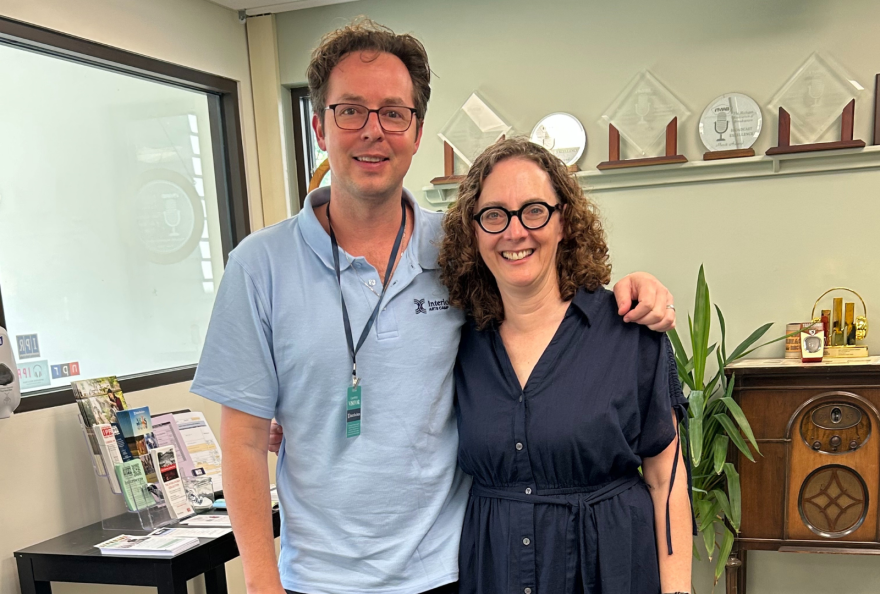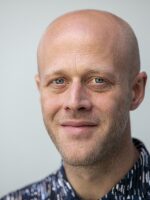The rising stars of Interlochen's World Youth Symphony Orchestra return to Kresge Auditorium for their second concert of the season. This Sunday, they are led by guest conductor Case Scaglione, Music Director of Orchestre national d'Ile-de-France.
Scaglione brings a deep admiration for the young musicians he’s leading.
“What’s wonderful about working with students like this is that you have this amazing talent and potential with no preconceived ideas,” he says. “So one really has the chance to start from scratch, even with a great masterpiece.”
Scaglione recently visited IPR to discuss his upcoming conducting debut with the ensemble — Sunday, July 6 at 7:30 p.m. at Kresge Auditorium.
Hear to Scaglione's full interview with IPR host Christy L'Esperance by clicking "Listen" above, or read the edited transcript below.
Attend the concert in person or listen to the live broadcast on Classical IPR.
Classical IPR's pre-show begins at 7:00 p.m ET; downbeat and our live broadcast starts at 7:30 p.m. ET.

Christy L’Esperance: The World Youth Symphony Orchestra is off to an amazing start, with last weekend's performance of Rachmaninoff's second symphony. The young musicians are right back to work, preparing in earnest for the second concert of the summer WYSO season at Interlochen. The conductor who will take the podium this week is the Music Director of Orchestre National de France, Case Scaglione, who joins us now in Studio A. Welcome to the northern Michigan woods!
Case Scaglione: Thank you so much for having me. You know, I'm from Texas, so Michigan reminds me a lot of home without the insufferable heat, so it's nice to be here.
"I was invited by my friend, Cristian Macelaru, and it is such an honor to be here. I always wanted to be a student at Interlochen. So to be here teaching is like a dream come true."Case Scaglione, WYSO guest conductor
CL: I hear you. So this is your first summer conducting the World Youth Symphony Orchestra. Can you tell us about what drew you here? What is the appeal of working on such a short time schedule, less than a full week, with young musicians who are at such a formative stage?
CS: Well, this has always been such a joyful process for me working with younger people. What's wonderful about working with students like this is that you have this amazing talent and potential with no preconceived ideas. One really has the chance to start from scratch, even with a great masterpiece that they're playing.
For me, Interlochen has a mythical touch to it. I went to undergraduate school at the Cleveland Institute of Music and did summer programs in other places. Everybody else had been to Interlochen and I never had a chance to be here. I was invited by my friend, Cristian Macelaru, and it is such an honor to be here, I have always wanted to be a student here. So to be here teaching is like a dream come true.
CL: You finally get to come, and you get to wear the uniform, too.
CS: Exactly. I'm glad to have my lanyard and everything.

CL: It's exciting for us. Well, you've conducted a long list of professional orchestras. There's a cohesion that happens in an established ensemble. But in contrast, this is just the second week of camp and this orchestra is just starting to get to know each other. With that in mind, what were your first impressions walking into the first rehearsal, which you just came from?
CS: There is excitement in the air. Everybody's thrilled to play this music. It's such a wonderful atmosphere. Martin Chalifour from the Los Angeles Philharmonic is up there helping us through the first rehearsal, and it's just a wonderful open atmosphere. I get the feeling the students really want to play. You couldn't spend your time anywhere better.
CL: Did you play in a youth orchestra? If you did, what were your best memories of that time?
CS: I was a trombone player in my former life, I came up in the Texas band system. And I did play in the Houston Youth Symphony for many seasons. And the thing that got me hooked was when we did the first movement of Mahler's Third Symphony. There's a really big trombone solo in that. I had practiced and practiced for the audition, and I won first chair, which was really exciting. And I got to play this trombone solo.
CS: To be inside of a landscape like that, and particularly the nature of that famous trombone solo where everything gets really quiet, and there's this rumble. I realized that doing it on stage, being in the moment, is something that is absolutely induplicable. It's a really addictive feeling. It solidified for me that that's what I wanted to do with the rest of my life.
CL: So the Dvorak has a little trombone solo in it.
CS: Yeah. It's one of the things that trombone players are always keeping on the excerpt list. The big fast crazy one is at the end of the finale, they have a pretty exciting lick.

CL: Oh, wow. So do you look at the trombone player knowingly during that point?
CS: I try not to, because I remember conductors looking at me, and that made me nervous. Yeah, you try not to make direct eye contact with the brass players. They've got a lot going on there.
CL: Right. There's a lot to think about for everyone up there. So you've chosen Dvorak's, most outdoorsy symphony to play in this outdoor venue. It's not long before you hear the birds in the orchestra. What excites you the most about sharing Dvorak's Eighth Symphony in particular with these players?
CS: I asked the students: “Who had played this?” and it was probably just a third of the orchestra. So, the idea of getting to traverse a masterpiece like Dvorak's Eighth Symphony, where 60 to 70 percent of the orchestra has never played it before, is a wonderful and frankly, rare opportunity. There is an accessibility to Dvorak's Eighth Symphony, especially for our public, regardless of the most seasoned classical music connoisseurs, to somebody who just wants to come and hear something for the first time.
CS: Every measure of it is accessible. There is a profundity to the music that comes from the sincerity of the folk music and this very Dvorak tradition. You feel like you can sing along one measure to the next without ever being camp or needlessly repetitive. And that's a really rare thing.
Dvorak somehow achieves this kind of brilliance that appeals to all listeners. Mozart had this too.
CL: And Dvorak kind of had one foot in America and the American song tradition, the sorrowful songs and spirituals, and another foot firmly planted in the Czech bohemian tradition.
CS: Yeah. Well, the funny thing about that is in the United States, it's a real chicken and egg situation. A lot of the cowboy songs playing on these thirds, like Dvorak's famous Ninth Symphony in the second movement with the english horns. This is obviously a spiritual, but when you're tracing the origins of these things, it's messy. Some things are stolen, some things kind of bleed into other traditions inadvertently. And there's a real circle of this Czech Music being American folk music, and back and forth.
CS: Obviously all of our culture, since we're all transplants here, is borrowed from somewhere else. That's why my wife, who's English and a non-musician, says, “I always have this feeling of cowboy music, hearing the melodies of Dvorak symphonies.” And that's why. It's largely Central Europe where a lot of these folk songs came from.
CL: And performing it at Interlochen with the World Youth Symphony Orchestra, because these players come from all corners of the country for sure, but also all over the world. Their common language is this music, so it gets even messier in a way to try to delineate what comes from what or where.
CS: Yeah, I mean at the end of the day, it sounds a little bit cliche, but it is all just one thing. These delineations between culture, background and whatever else sort of fall away. And, somehow we find ourselves here at Interlochen, playing off the same stand to music, using the same bow amount, and looking at the same note. And what comes out is what really makes music such a special and unique thing.
CL: So beautiful. It's what keeps us coming back.
CS: Absolutely.
CL: What should first time listeners listen for in the symphony?
CS: First time listeners should not listen for anything. They should just hear. Let this thing wash over them and take the emotional ride. It really scales these ranges of, of emotion from love and passion to the melancholy of the beginning. And I would say just sit back, enjoy it, and let it wash over you and take you wherever it goes.
CS: I feel like whenever I'm listening to something for the first time, if I try to tune into something too much, one runs the risk of missing something.
CL: I think it's interesting that this is such a bucolic symphony. It's considered almost a pastoral symphony. Dvorak loved the outdoors, he would go on these long walks and draw from the natural landscape when he's composing. He even wrote a piece called “In Nature's Realm.” But, he suffered from agoraphobia, he was often fearful about going outside. In fact, he missed the premiere of his Symphony Number Nine because of that condition. So it's this play between being drawn into and also repelled by the outdoors at the same time.
CS: Yeah. There's something about that nature thing that it is the “original place.” That place where all the natural sounds happen. That silence, I think, is us trying to get back to what our natural sense of the world is. And the great ones can do that .
CL: So it's known for its bucolic feel, but also for its strong flavor of bohemian folk culture. Where in the symphony can we especially hear Dvorak's Czech roots?
CS: Oh, I mean it's everywhere. But particularly the third movement in this waltz kind of “in three” feel. It's funny, because this music is so central European. It's not far from Germany and all the things we're used to hearing, Italian, German, French music, but somehow it feels a million miles away. It really gives away these bohemian Czech roots in the third and fourth movements, particularly in the last one.
CS: The clothing is familiar. It sounds German romantic, but it's absolutely not. It is its own thing.
CL: So, also on the program is Jeff Scott's "Count Down: 10 Minutes to Live.” It had a really interesting genesis. Can you tell us a little bit about it?
CS: Yeah! Jeff saw something in the news that basically gave him this idea of: “What if one was given a fixed amount of time to live?” And this music really traverses the range of emotions that would happen. The kind of searching, thinking about one's own mortality. The result is a brilliantly colorful romp of a piece.
CL: And in this particular case, you only have 10 minutes.
CS: That's right.
CL: 10 minutes to live. That's a lot to pack in. There's a quote from the composer that said, “When you try to throw that much emotion into something that short, it ends up being sort of a cauldron.”
CS: That's right. Yeah. I mean, if you can imagine an entire symphony pushed into a trash compactor, that's basically the idea.
CL: And maybe there’s a metaphor, this experience of these young musicians compacted into these intense weeks of preparation in musicianship and connection. I'm sure there's a lot of emotion that goes on with that too.
CS: There is a lot of emotion. What I found for me, some of these experiences in my formative years of getting to play a symphony like this one for the first time, is that these revelations unfold themselves slowly afterwards. Sometimes it takes six months to one year for these experiences to fully materialize in your nervous system. There are things that I look back on fondly and still draw wisdom from 30 years later.
CL: Many Interlochen campers and academy students do go on to professional careers. They are dreaming of it, a lot of them in the group are. What advice will you share with these Interlochen students during this process, to help bridge that gap between student and professional artistry?
CS: Well, the way to bridge that gap is to not view it as a gap. Something that I've always tried to do, and I say this openly to my orchestras even in the professional world, is to remain a perpetual student. And that is to benefit from the experience that you have, but never allow any rigidity and that this is how it has to be.A good idea can come from anywhere. And when we stay open to this, and we have what I say, strong ideas, but loosely held. I do to this day, to remain in this beginner's mindset.
CS: There's a great quote by the great poet T.S. Eliot. Somebody asked him about his meaning in his poetry, and he said, “The meaning of the poetry or the meaning of a work of art or a symphony orchestra, is nothing more than the cheap meat that you feed to the dog while you rifle through the jewelry.” Meaning that the real work sort of happens underneath the surface and organically. And that's a beautiful process.
CL: Well, we'll be able to hear and see that process in real time on Sunday. Case Scaglione will conduct the World Youth Symphony Orchestra in concert Sunday, July 6th at 7:30 p.m. in Kresge Auditorium on the Interlochen campus. It's an exciting program with Dvorak's Eighth Symphony and Jeff Scott's "Count Down: 10 minutes to Live”. Case Scaglione, thank you so much for your time today. I really look forward to the concert.
CS: Thank you for having me. I'm looking forward to it as well.









